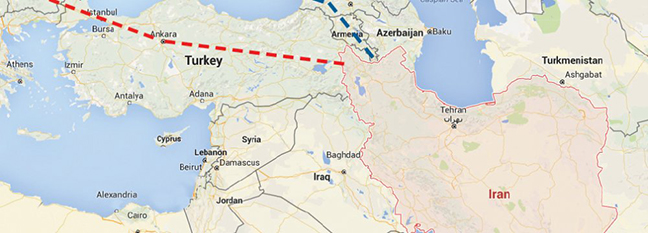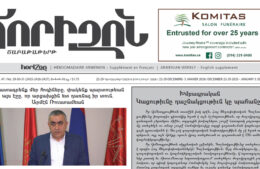European Cargo Reaches Iran Via Armenia Instead of Turkey
- (0)

After running into issues with the Turkish route (in red), the International Transport Association of Iran began searching for alternative routes, such as the route passing through Armenia (as shown in blue). (Photo: Financial Tribune)
TEHRAN, Iran (Financial Tribune)—A maiden shipment has arrived in Iran from Germany via a multimodal transit route connecting Iran to Europe via the Black Sea, secretary of International Transport Association of Iran, Gholamhossein Amiri, announced.
Plans are underway for the route to replace the one passing through Turkey.
“Two cargo containers have entered Iran from the Armenian border,” Amiri was quoted as saying by Mehr News Agency.
“The containers were shipped from Hamburg in a relatively shorter journey compared to the Turkish route.”
Amiri did not mention the exact date of the arrival.
“In the past couple of years, we have had problems on the Turkish side of the border regarding transportation of cargo from Europe. This prompted us to start negotiations with several other countries for alternative routes,” he said.
Tehran and Ankara have been grappling with a longstanding transit dispute, arising from different fuel prices in the two neighboring countries. The issue led the government to take measures, such as charging Turkish trucks a fee to compensate the considerably low fuel prices in Iran to sealing the Turkish trucks’ fuel tanks at the Bazargan-Dogubayazit border crossing.
The common border has frequently been the scene of traffic congestion with transit trucks queuing at the border in lines reaching 15 kilometers at times.
Agreements signed by the neighboring countries’ customs officials have done little to help solve the problem.
Security Issue With Turkey
Border security is another issue hindering transit via Turkey. While on Turkish soil, several Iranian trucks have been the target of arson attacks, which Ankara blamed on armed forces affiliated to Kurdistan Workers’ Party.
The Iranian government demanded Ankara guarantee the safety of Iranian trucks, but the results were found to be unsatisfactory, which led to lack of confidence in Turkey’s ability to stem the violence. Consequently, Iran’s Ministry of Roads and Urban Development advised companies shipping to Europe to avoid routes passing through Turkey.
The ministry advised truck drivers to take two alternative routes: one through Azerbaijan, Russia and Belarus; and another through Armenia, Georgia, the Black Sea and then into Romania or Bulgaria.
“The cost of cargo transportation via the [new] route was 1-2% lower [compared to the Turkish route],” Amiri said.
Recent negotiations with Azerbaijan, Armenia, Georgia, Bulgaria, Italy and Greece have centered around a transit corridor involving Azerbaijan, Armenia, Georgia, the Black Sea, Bulgaria, Greece and Italy. According to Amiri, an agreement has been signed by Iran, Armenia and Georgia regarding implementation of the corridor.
Trucks are shipped by roll-on/roll-off ships from Georgia to Bulgaria across the Black Sea. The same method can also be used for trucks shipping goods from Greece’s southern ports to Italy using the Mediterranean Sea.


















